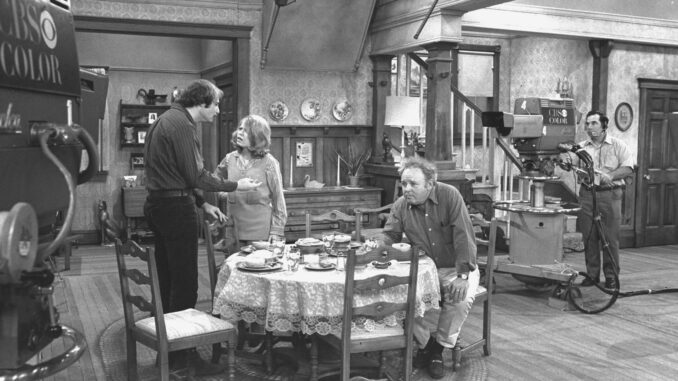
The Timeless Impact of Archie Bunker
Few sitcom characters have sparked as much debate, laughter, outrage, and introspection as Archie Bunker. More than 50 years after All in the Family premiered, Archie remains a cultural touchstone—a complicated, flawed, hilarious reflection of America’s past and present. But why does he still resonate? What makes this ’70s character continue to echo through generations?
Let’s dive into the legacy of Archie Bunker and explore why his presence still feels incredibly relevant in today’s world.
The Birth of an Unforgettable Television Character
A Mirror—Not a Model
Archie wasn’t designed to be admired. He wasn’t the hero. He wasn’t the role model. He was a mirror—reflecting the biases, fears, and generational clashes that shaped American households in the 1970s.
Norman Lear didn’t create Archie to endorse his views. He created him to expose them.
Carroll O’Connor’s Magic Touch
Even with powerful writing, Archie wouldn’t have worked without Carroll O’Connor’s ability to give him humanity. O’Connor didn’t play Archie as a villain—he played him as a man shaped by his era, his upbringing, and a rapidly changing world.
That blend of stubbornness, humor, and vulnerability made Archie unforgettable.
Why Archie Still Hits Home in 2025
The Same Debates—New Vocabulary
Race relations. Gender roles. Politics. Cultural shifts.
Everything Archie fought about still dominates conversations today; we just use different language.
Sometimes it feels like America didn’t change much—we just switched our talking points.
Generational Clashes Haven’t Gone Anywhere
Archie vs. Meathead will forever symbolize:
-
Old values vs. new ideas
-
Tradition vs. progress
-
Comfort vs. change
Sound familiar? Today it’s Boomers vs. Millennials, Gen X vs. Gen Z, parents vs. kids. The arguments may be on social media now instead of around a Queens dining table, but the friction hasn’t changed.
Flawed Characters Feel More Real
Modern TV often sanitizes characters to avoid controversy. Archie wasn’t sanitized. He said the wrong thing—often. He messed up—constantly. He represented real people, real attitudes, real frustrations.
That honesty is part of why he endures.
The Lessons Archie Bunker Still Teaches

We Learn More Through Humor
Humor softens the edges of uncomfortable conversations. Archie’s rants—ridiculous, exaggerated, and outrageous—made viewers laugh before they reflected.
Comedy became the entry point to talk about things families usually avoided.
Growth Is Possible—Slowly, Imperfectly
Archie changed. Not dramatically, not heroically, but realistically. He took tiny steps forward. Sometimes he regressed. Sometimes the world changed faster than he could swallow.
And that’s why he resonated. Change isn’t a straight line.
People Aren’t Just One Thing
One of the most powerful aspects of Archie Bunker is that he wasn’t just “wrong.” He wasn’t just “ignorant.” He wasn’t just “biased.”
He was also:
-
Loving
-
Hard-working
-
Protective
-
Generous
-
Vulnerable
He was complicated—like real people.
Archie Bunker and Today’s Cancel Culture
He Couldn’t Exist Today—On TV, at Least
Networks today would never green-light a character like Archie Bunker. Studios fear backlash. Advertisers fear social-media storms. Writers fear misinterpretation.
But ironically…
Archie Exists Everywhere in Real Life
Archie still lives:
-
at dinner tables
-
on Facebook comment threads
-
in political debates
-
in neighborhood conversations
-
in every “you just don’t get today’s world” argument
We still know Archies. We still ARE Archies sometimes. He’s part of the fabric of American identity.
All in the Family’s Surprising Relevance
The Show Predicted Modern Culture Wars
Topics the show covered include:
-
immigration
-
women’s rights
-
LGBTQ+ visibility
-
political polarization
-
economic inequality
Sound like today’s headlines? Exactly.
The Power of Uncomfortable Storytelling
All in the Family didn’t shy away from anything—guns, racism, religion, sexual assault, war, inflation. It forced people to confront the world they lived in, even if they’d rather ignore it.
No show has replicated that boldness since.
Why We Still Need Archie Bunker
To Understand Ourselves
Archie helps us examine where our beliefs come from—and how they evolve. He forces us to ask:
Why do I think the way I do?
What shaped my worldview?
Where can I grow?
To Keep Tough Conversations Alive
Archie creates a safe space for unsafe topics. He lets people laugh while they reflect. Shows today tend to avoid messy characters, but messy characters are the ones who help us talk about life’s hardest truths.
To Remind Us Change Is Slow
Archie shows us that people don’t transform overnight. Progress takes:
-
patience
-
empathy
-
persistence
-
uncomfortable conversations
And sometimes…a lot of yelling around the kitchen table.
Archie Bunker’s Legacy in Modern Television
He Opened the Door for Bold Characters
Without Archie, we might not have:
-
Red Forman
-
Al Bundy
-
Homer Simpson
-
Frank Gallagher
-
Stan Smith
All of them owe something to the blueprint Archie created.
The Authenticity Standard
Television today tries to feel “real,” but Archie was real. His presence raised the standard for authenticity, truthfulness, and honest storytelling in sitcoms.
Will We Ever See Another Archie Bunker?
The Answer Is Complicated
Television may never allow another Archie—but society will continue creating them. The world keeps producing people who struggle with rapid change, shifting norms, and evolving identities.
That’s why Archie’s story still matters.
Conclusion
Archie Bunker is more than a sitcom character—he’s a cultural landmark. He represents a specific time in America, yet he continues to mirror our modern struggles. His blunt humor, stubborn worldview, and reluctant growth still hit home today because his flaws are universal.
We need characters like Archie—not to celebrate their beliefs, but to confront them. To laugh, reflect, question, and grow. His legacy reminds us that progress starts with uncomfortable conversations, and sometimes, the best way to begin is through humor.
